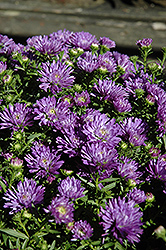It's all about ...
plants

Blue Henry Aster
Symphyotrichum 'Blue Henry'
Height: 16 inches
Spread: 16 inches
Sunlight:
![]()
![]()
Hardiness Zone: 4a
Other Names: New York Aster, Michaelmas Daisy
Group/Class: Royalty Series
Description:
Profusion of lavender-blue button flowers on a compact mounded plant; prefers cool, moist soil; water the root zone instead of from the top to reduce fungal disease; water regularly to encourage more blooms
Ornamental Features
Blue Henry Aster has masses of beautiful lavender daisy flowers with blue overtones at the ends of the stems from late summer to late fall, which are most effective when planted in groupings. The flowers are excellent for cutting. Its narrow leaves remain dark green in colour throughout the season.
Landscape Attributes
Blue Henry Aster is a dense herbaceous perennial with an upright spreading habit of growth. Its relatively fine texture sets it apart from other garden plants with less refined foliage.
This is a relatively low maintenance plant, and is best cleaned up in early spring before it resumes active growth for the season. It is a good choice for attracting butterflies to your yard, but is not particularly attractive to deer who tend to leave it alone in favor of tastier treats. Gardeners should be aware of the following characteristic(s) that may warrant special consideration;
- Disease
Blue Henry Aster is recommended for the following landscape applications;
- Mass Planting
- Border Edging
- General Garden Use
- Container Planting
Planting & Growing
Blue Henry Aster will grow to be about 16 inches tall at maturity, with a spread of 16 inches. Its foliage tends to remain dense right to the ground, not requiring facer plants in front. It grows at a medium rate, and under ideal conditions can be expected to live for approximately 10 years. As an herbaceous perennial, this plant will usually die back to the crown each winter, and will regrow from the base each spring. Be careful not to disturb the crown in late winter when it may not be readily seen!
This plant does best in full sun to partial shade. It prefers to grow in average to moist conditions, and shouldn't be allowed to dry out. It is not particular as to soil type or pH. It is somewhat tolerant of urban pollution. This particular variety is an interspecific hybrid. It can be propagated by division; however, as a cultivated variety, be aware that it may be subject to certain restrictions or prohibitions on propagation.
Blue Henry Aster is a fine choice for the garden, but it is also a good selection for planting in outdoor pots and containers. It is often used as a 'filler' in the 'spiller-thriller-filler' container combination, providing a mass of flowers against which the larger thriller plants stand out. Note that when growing plants in outdoor containers and baskets, they may require more frequent waterings than they would in the yard or garden. Be aware that in our climate, most plants cannot be expected to survive the winter if left in containers outdoors, and this plant is no exception. Contact our experts for more information on how to protect it over the winter months.
This plant is not reliably hardy in our region, and certain restrictions may apply; contact the store for more information.
